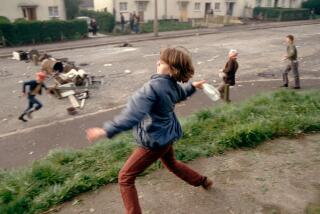Ulster Forces Aiding Protestant Gunmen, IRA Asserts
- Share via
LONDON — An apparent attempt by members of a Protestant paramilitary group in Northern Ireland to justify the slaying of a 28-year-old Roman Catholic triggered an international political controversy Wednesday and cast a spotlight on a little-known aspect of the sectarian struggle.
On Tuesday night, a British Broadcasting Corp. correspondent reported from Belfast that he had been taken at gunpoint by four masked men to a home in County Down, where he was shown official security documents and videotapes identifying members of the outlawed Provisional Irish Republican Army, a Catholic underground group battling against British rule in Northern Ireland.
On the list, he said, was the name of Loughlin Maginn, 28, who was slain at his home in County Down last Friday by Protestant gunmen of the Ulster Freedom Fighters, which is also outlawed. The evidence was meant to support a UFF charge that Maginn had acted as an IRA liaison officer, a charge his family denies.
Presumably Leaked or Stolen
What sparked the controversy, however, was the nature of the evidence shown the BBC reporter--evidence that appeared to come from official intelligence sources and presumably was either leaked or stolen.
The IRA’s legal political wing, Sinn Fein, charged that the incident proved collusion between the British-controlled security forces and illegal paramilitary groups from the majority Protestant community in Northern Ireland.
Seamus Mallon, a member of the British Parliament from Northern Ireland representing the mainly Catholic Social Democratic Labor Party, said Wednesday that it is critical that the source of the documents be uncovered.
“It is more than just that which is issued to the ordinary constable or squaddie (police officer or soldier),” Mallon, who is the security spokesman for his party, said of the material shown to the BBC correspondent. “I think it is something which has come from, or been taken from, a fairly senior level.”
John Cope, the British government minister for law and order in Northern Ireland, said that the provincial police force, the Royal Ulster Constabulary, has begun an investigation into the incident, and he pledged tough action against any leakers.
“If it is found that any members of the security forces have been helping terrorists, I have no doubt they will be prosecuted with the full severity of the law,” Cope said.
He speculated that the UFF may have shown the material to the BBC man in an effort to discredit the security forces, which he said the Protestant paramilitary groups had as much reason to hate as the IRA.
Meanwhile, the suggestion of collusion between Protestant terrorists and the predominantly Protestant Northern Ireland security forces is straining the already complicated relations between Britain and the Republic of Ireland.
Peter Barry, a former Irish foreign minister, called the disclosures “outrageous” and said the government in Dublin is not doing enough to demand a British response.
The Dublin daily Irish Press said Wednesday that “there has always been a deep suspicion in the nationalist community in Northern Ireland that loyalist (Protestant) paramilitaries were receiving a certain amount of intelligence from some security source.”
Worst Suspicions
“The implications of this whole (BBC) affair,” it went on, “are so far-reaching that only urgent action by the RUC (Royal Ulster Constabulary) will allay the worst suspicions of the nationalists.”
A spokesman for the Irish government said it is seeking clarification of the reports under the Anglo-Irish agreements on Northern Ireland that give Dublin a voice in the province’s internal affairs.
A senior British official in Northern Ireland noted that the allegations of collusion come only about two weeks before a scheduled meeting of Britain’s secretary of state for Northern Ireland, Peter Brooke, and Irish Foreign Minister Gerry Collins.
It is British policy to put Northern Ireland’s security as much as possible in the hands of the local population. In practice, however, nationalist opposition to any symbol of British authority means that the overwhelming majority of locally recruited forces are from the Protestant community.
Nationalist suspicion in the latest incident turned immediately on the Ulster Defense Regiment, a locally recruited army auxiliary force with 6,300 members, more than half of whom are part-time soldiers and 96% of whom are Protestant. Sixteen serving UDR members have been convicted of murder since the unit was formed in 1970, and seven others have been convicted of manslaughter, an army spokesman said Wednesday. In most of these killings the victim was Catholic.
The army spokesman said no statistics are available on the number of UDR members convicted of lesser sectarian offenses, but many have been jailed over the years for supplying intelligence and other security-related information to Protestant paramilitaries.
The Royal Ulster Constabulary, which has more than 12,000 members and is the largest force in the province, is also mainly Protestant.
There are also about 10,000 regular British army troops on duty in Northern Ireland.
More to Read
Sign up for Essential California
The most important California stories and recommendations in your inbox every morning.
You may occasionally receive promotional content from the Los Angeles Times.










